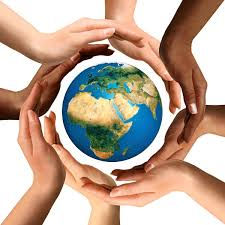Changing People's Hearts and Minds First Leads to Changing Planet Earth
- Ray Gutoski
- May 26
- 4 min read

In a world that feels increasingly divided along political, economic, and cultural lines, it’s easy to believe that progress depends solely on convincing politicians to act. But history tells a deeper story: before political will is built, consciousness must be awakened.
All great movements—whether for civil rights, women’s rights, environmental justice, or peace—did not begin in legislative halls. They began in the hearts and minds of ordinary people who began to see the world differently, speak out, and inspire others.
“Political change is downstream from cultural and spiritual awakening.”
Why Consciousness Comes First
Laws reflect society's values—but they rarely lead them. For real, lasting change to happen:
People must first recognize the injustice or urgency
New shared values and visions must emerge
A shift in awareness must take place across culture, conversation, and community
This awakening doesn't come from political speeches—it comes from:
Books and journalism that spark dialogue
Art and music that stir the soul
Films, education, and public discourse that open hearts and shift narratives
Everyday people having brave, honest conversations that plant seeds of change
Of Course, Political Action Is Essential Too
Make no mistake—political action is a vital part of the process. Change requires:
Peaceful protest
Letters and calls to leaders
Town halls and community organizing
Voting and civic engagement
But these efforts are most powerful after a shift in public consciousness. When enough people awaken to a new set of values—when they see differently—they create the pressure and momentum that leaders can no longer ignore.
Without that deeper awareness and shared vision, political action often becomes reactive, divided, or easily stalled.
The Power of Dialogue: Where Change Truly Begins
At the heart of every cultural awakening is dialogue.
Dialogue is not debate. It is not argument. It is the courageous act of listening and speaking with respect, across differences, in search of understanding and shared humanity.
Dialogue is what makes us human. It allows us to:
Recognize one another’s dignity
Bridge differences through shared values
Grow together, even when we disagree
Find common ground to build common goals
Whether it happens:
Between two individuals in a heartfelt conversation
In classrooms where students explore what justice means
In religious communities reflecting on shared moral responsibility
Or in public forums, workshops, and community circles...
Dialogue sows the seeds of change. It creates empathy. It opens the mind. It transforms fear into respect and division into cooperation.
“Peace is not the absence of conflict—it is the presence of creative dialogue.”
All Great Movements Started with Consciousness
Take the civil rights movement: Before policy changed, courageous individuals—writers, activists, teachers, clergy, and artists—shared stories, staged protests, and reshaped how Americans thought about race and justice.
The women’s rights movement began with voices in literature, speeches, and community organizing—before there was enough pressure to amend laws and break barriers.
The environmental movement grew from a growing awareness that human actions were harming the planet—first through books like Silent Spring, documentaries, youth protests, and science-based journalism. Then, political will followed.
“No social movement ever began in a government office. It begins with a new way of seeing the world.”
We Need Common Goals That Transcend Politics
Right now, the world is facing challenges that no political party can solve alone:
Climate change
Global inequality
War and nuclear threats
Loss of shared values and mutual respect
To overcome these, we must create common goals rooted in shared human values—not partisanship.
We must recognize:
The dignity of all life
Our interconnectedness across nations, cultures, and beliefs
The need to create a sustainable, peaceful, and fair world for future generations
These are not political ideologies. They are moral and spiritual foundations—ones that people from every background can agree on when we step beyond slogans and see each other as human beings.
How to Create Consciousness That Leads to Political Will
Here’s how individuals, communities, and movements can help create a global shift:
1. Speak to the Soul, Not Just the System– Use storytelling, art, and honest conversations to awaken empathy and awareness.
2. Lead with Values, Not Parties– Emphasize shared values like justice, compassion, dignity, and cooperation.
3. Build Cultural Momentum First– Support books, films, education, and music that explore these themes and move hearts.
4. Create Spaces for Dialogue– Facilitate conversations in homes, classrooms, religious communities, and public forums where people can share their visions, fears, and hopes—respectfully and openly.
5. Help Translate Consciousness Into Action– As public awareness grows, channel it into civic engagement: voting, organizing, and holding leaders accountable to the people’s evolving values.
Conclusion: The Future Starts in the Heart, Not the Ballot Box
Laws can only go so far. Political will is a reflection of public will—and public will is born from shifts in awareness, fostered through dialogue, reflection, and shared vision.
We don’t have to wait for permission to change the world. We start by changing how we think, speak, and act, and by uniting around a common vision of dignity, peace, and planetary care.
“Revolutions begin when people no longer see the world as acceptable.”And when they begin to imagine something better—together.
Would you like this adapted into a dialogue-based discussion guide, classroom resource, or interfaith community handout? I’d be happy to help!



Comments